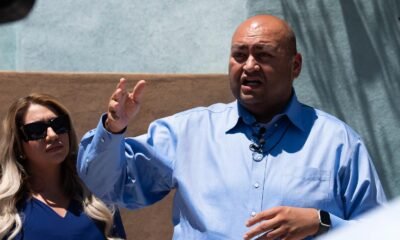arizona
25-Year-Old Congressional Hopeful Shines a Light on Gen Z Issues

Deja Foxx aims to become the first woman of Generation Z in Congress, positioning herself as a trailblazer in a political landscape largely dominated by older generations.
At 25, Foxx is eligible to run for Congress and seeks to win a primary on July 15 for the 7th Congressional District in southern Arizona. If victorious, she will represent a significant generational shift in a state where older demographics, such as Baby Boomers and Millennials, hold the majority of political power.
The Pew Research Center defines Generation Z as those born between 1997 and 2012, with current ages ranging from 13 to 28. Despite the age requirements for candidacy, many Gen Z individuals find themselves unable to run due to strict eligibility criteria and various political hurdles.
Foxx emphasizes the importance of investing in younger leaders, arguing for the need to amplify the voices of young constituents. “We have to invest in them,” she stated, highlighting the opportunity for meaningful representation in upcoming elections.
The recent deaths of several prominent politicians have reignited discussions about age in Congress. Most notably, U.S. Rep. Raul Grijalva passed away in March at 77, igniting concerns about the aging political landscape. Currently, the average age in the Arizona Senate is 57, while the House averages 51.
All of Arizona’s statewide elected officials are over 50, with the oldest being 80-year-old Superintendent of Public Instruction Tom Horne. This trend raises questions about the relevance of older politicians in addressing the needs of younger constituents.
Young lawmakers face unique challenges in gaining credibility. Sen. Analise Ortiz, age 32, reflected on her initial campaign at 27, noting how some voters mistook her for a high school student. She reported receiving pushback from older colleagues, revealing a broader issue of age bias in the legislative environment.
At the Democratic level, both Foxx and Ortiz have struggled for support from party leadership, compounding the difficulty of running as younger candidates. In sharp contrast, young Republican candidates, like Ari Bradshaw, report easier access to party resources, hinting at a disparity in support across party lines.
Bradshaw, who ran unsuccessfully for a House seat, emphasized the financial toll of campaigning on young candidates. Low salaries and demanding schedules make it tough for them to juggle personal and political responsibilities, creating barriers to entry.
Both Foxx and Ortiz advocate for younger representation, arguing that older politicians, despite their experience, may not fully grasp the unique challenges facing their generation. “It is up to us to turn things around,” Ortiz remarked.
Foxx envisions her campaign as a step toward reshaping the political landscape, leveraging new fundraising methods that transcend traditional gatekeeping. She and others urge Gen Z to consider political involvement as a means of enacting change, fostering a culture of active participation among younger constituents.
Despite facing setbacks, Foxx and Bradshaw remain hopeful, encouraging peers to seek local or state office. “You may not move the gears all by yourself, but you can make a difference,” Bradshaw advised, advocating for collective action among young voters.


















